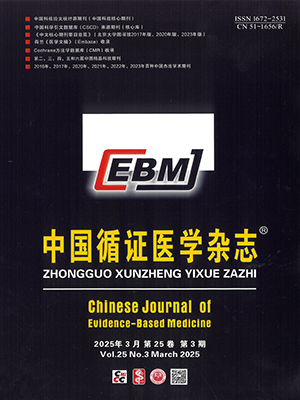| 1. |
Ferlay J, Shin HR, Bray F, et a1. IARC CancerBase No. 10. Lyon: International Agency for Research on Cancer, 2010: 29.
|
| 2. |
黄月香, 秦立强, 王培玉. 牛奶及奶制品对胃癌发病影响的综合分析. 中华预防医学杂志, 2009, 43(3): 193-196.
|
| 3. |
李萌, 龙彭年, 肖四海. 世界辣椒产业经济发展状况与我国的对策思考. 辣椒杂志, 2010, (4): 1-5.
|
| 4. |
王永平, 张绍刚, 张婧, 等. 我国辣椒产业发展现状及趋势. 河北农业科学, 2009, 13(6): 135-138.
|
| 5. |
Stefani DE, Correa P, Boffetta P, et al. Plant foods and risk of gastric cancer: a case-control study in Uruguay. Eur J Cancer Prev, 2001, 10(4): 357-364.
|
| 6. |
Lee JK, Park BJ, Yoo KY, et al. Dietary factors and stomach cancer: a case-control study in Korea. Int J Epidemiol, 1995, 24(1): 33-41.
|
| 7. |
Wells G, Shea B, O'Connell D, et al. New castle-ottawa quality assessment scale-cohort studies. Available at: http://www.ohri.ca/programs/clinical_epidemiology/oxford.asp.
|
| 8. |
Gajalakshmi CK, Shanta V. Lifestyle and risk of stomach cancer: a hospital-based case-control study. Int J Epidemiol, 1996, 25(6): 1146-1153.
|
| 9. |
Goh KL, Cheah PL, Md N, et al. Ethnicity and H. pylori as risk factors for gastric cancer in Malaysia: A prospective case control study. Am J Gastroenterol, 2007, 102(1): 40.
|
| 10. |
Vecchia C, Negri E, Decarli A, et al. A case-control study of diet and gastric cancer in northern Italy. Int J Cancer, 1987, 40(4): 484-489.
|
| 11. |
López-Carrillo L, Avila MH, Dubrow R. Chili pepper consumption and gastric cancer in Mexico: a case-control study. Am J Epidemiol, 1994, 139(3): 263-271.
|
| 12. |
López-Carrillo L, Lópezcervantes M, Roblesdíaz G, et al. Capsaicin consumption, Helicobacter pylori positivity and gastric cancer in Mexico. Int J Cancer, 2003, 106(2): 277-282.
|
| 13. |
López-Carrillo L, Camargo MC, Schneider BG, et al. Capsaicin consumption, Helicobacter pylori CagA status and IL1B-31C > T genotypes: a host and environment interaction in gastric cancer. Food Chem Toxicol, 2012, 50(6): 2118-2122.
|
| 14. |
Marcia GV, Cantoral A, Oñateocaña LF, et al. Gastric cancer in relation to the intake of nutrients involved in one-carbon metabolism among MTHFR 677 TT carriers. Eur J Nutr, 2009, 48(5): 269-276.
|
| 15. |
Mathew A, Gangadharan P, Varghese C, et al. Diet and stomach cancer: a case-control study in South India. Eur J Cancer Prev, 2000, 9(2): 89.
|
| 16. |
Nubia M, Plummer M, Vivas J, et al. A case-control study of gastric cancer in Venezuela. Int J Cancer, 2001, 93(3): 417-423.
|
| 17. |
薛清萍, 潘雄飞, 李思齐, 等. 四川省胃癌与生活习惯和行为影响因素关系分析. 现代预防医学, 2015, 42(7): 1257-1260.
|
| 18. |
Al-Qadasi FA, Shah SA, Ghazi HF. Tobacco chewing and risk of gastric cancer: a case-control study in Yemen. East Mediterr Health J, 2017, 22(10): 719.
|
| 19. |
Bermúdez, Insuasty C, Gamarra J, et al. Blood group A and gastric cancer risk in the hospital Universitario de Santander (Bucaramanga, Colombia). Acta Médica Colombiana, 2006, 31(4): 400-410.
|
| 20. |
Botterweck AA, Pa VDB, Goldbohm RA. A prospective cohort study on vegetable and fruit consumption and stomach cancer risk in the Netherlands. Am J Epidemiol, 1998, 148(9): 842-853.
|
| 21. |
López-Carrillo L, Lópezcervantes M, Ramírezespitia A, et al. Alcohol consumption and gastric cancer in Mexico. Cad Saude Publica, 1998, 14(suppl 3): 25.
|
| 22. |
彭慧, 黄芳, 张一英, 等. 上海市嘉定区胃癌危险因素的病例-对照研究. 中国慢性病预防与控制, 2012, 20(6): 668-671.
|
| 23. |
Zuleta G, Regino MO, Lobo WR, et al. Factores de riesgo para cáncer gástrico en pacientes colombianos. Rev Colomb Gastroenterol, 2009, 24(2): 134-143.
|
| 24. |
王永平, 张绍刚, 何嘉, 等. 国内外辣椒产业发展现状及趋势. 现代农业科学, 2009, (6): 267-270.
|
| 25. |
张西露, 毛亦卉, 向拉蛟. 国内外辣椒产业研究开发的现状分析. 辣椒杂志, 2008, (1): 1-5.
|
| 26. |
Lv J, Lu Q, Yu C, et al. Consumption of spicy foods and total and cause specific mortality: population based cohort study. BMJ, 2015, 351(2): 245-250.
|
| 27. |
Singletary K. Red pepper: overview of potential health benefits. Nutrition Today, 2011, 46(1): 33-47.
|
| 28. |
Kim CS, Park WH, Park JY, et al. Capsaicin, a spicy component of hot pepper, induces apoptosis by activation of the peroxisome proliferator-activated receptor gamma in HT-29 human colon cancer cells. J Med Food, 2004, 7(3): 267-273.
|
| 29. |
Nakadaira H, Lang I, Szentirmay Z, et al. A case-control study of gallbladder cancer in Hungary. Asian Pac J Cancer Prev, 2009, 10(5): 833-836.
|
| 30. |
Kim CS, Kwon HJ, Kim GE, et al. Attenuation of natural killer cell functions by capsaicin through a direct and TRPV1-independent mechanism. Carcinogenesis, 2014, 35(7): 1652.
|
| 31. |
Chow J, Norng M, Zhang J, et al. TRPV6 mediates capsaicin-induced apoptosis in gastric cancer cells-Mechanisms behind a possible new "hot" cancer treatment. Biochim Biophys Acta, 2007, 1773(4): 565.
|
| 32. |
Satyanarayana MN. Capsaicin and gastric ulcers. Crit Rev Food Sci Nutr, 2006, 46(4): 275-328.
|
| 33. |
Icli F, Akbulut H, Yalcin B, et al. Education, economic status and other risk factors in gastric cancer: a case-control study of Turkish oncology group. Med Oncol, 2011, 28(1): 112-120.
|
| 34. |
Pabalan N, Jarjanazi H, Ozcelik H. The impact of capsaicin intake on risk of developing gastric cancers: a meta-analysis. J Gastrointest Cancer, 2014, 45(3): 334-341.
|
| 35. |
Lee SA, Kang D, Shim KN, et al. Effect of diet and Helicobacter pylori infection to the risk of early gastric cancer. J Epidemiol, 2003, 13(3): 162.
|
| 36. |
Nan HM, Park JW, Song YJ, et al. Kimchi and soybean pastes are risk factors of gastric cancer. World J Gastroenterol, 2005, 11(21): 3175-3181.
|
| 37. |
Zhang YW, Eom SY, Kim YD, et al. Effects of dietary factors and the NAT2 acetylator status on gastric cancer in Koreans. Int J Cancer, 2009, 125(1): 139-145.
|




